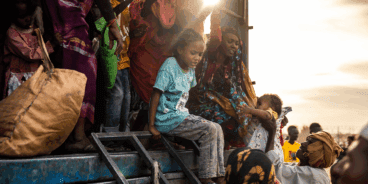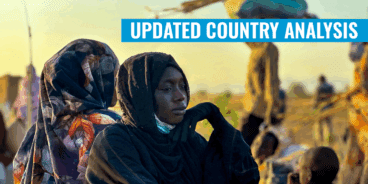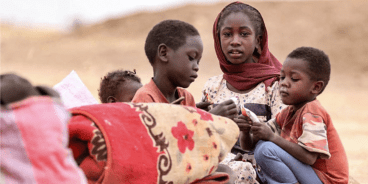
Statement on Atrocities in South Kordofan
United Nations (UN) member states must uphold their responsibility to protect and take immediate action to protect populations from atrocities being perpetrated daily by Sudanese government security forces, and allied paramilitary forces and militias in South Kordofan. Since 5 June the Sudanese Armed Forces (SAF) has unleashed a barrage of indiscriminate aerial bombardment targeting civilians. With reports of mass graves and at least 73,000 people displaced, this is not the time for states to “wait and see” how things transpire. With each passing day the situation becomes more complex and intractable and the plight of civilians more dire.
The Sudanese government has, as in Darfur, tried to hide the horrific consequences of its actions by restricting the access of the UN, media and independent monitors to the region. Yet credible reports indicate that the government is actively perpetrating atrocities against its own people. What began as an SAF operation ostensibly to disarm the Sudanese People‟s Liberation Army-North (SPLA-N), a rebel group that fought alongside its southern counter-part against the SAF during Sudan‟s 1983-2005 civil war, has escalated rapidly. In addition to daily aerial bombardment, the SAF and the Popular Defence Forces, an allied paramilitary force, have conducted house-to-house searches and imposed road blocks. This has been part of a deliberate strategy to target individuals for extra-judicial execution, abduction, arbitrary arrest and detention, and torture on the basis of his or her ethnicity and perceived support for the SPLA-N and its political arm, the SPLM-N. There are also reports that the SPLA-N has carried out extra-judicial killings.
The Nuba have borne the brunt of such targeting. They are marginalized and discriminated against by the Sudanese government on the grounds that they are not “Arab,” and that many Nuba supported anti-government movements during the 1983-2005 civil war. Experts have labeled the government‟s brutal actions against the Nuba during the early 1990‟s, genocide. Once again the Nuba are the victims of mass atrocities. A leaked report by the UN peacekeeping mission in Sudan (UNMIS) argues that crimes perpetrated since the outbreak of fighting may amount to crimes against humanity and war crimes – crimes that states unanimously committed to protect populations from by endorsing the responsibility to protect at the 2005 World Summit.
At the core of this commitment is the responsibility to prevent crimes before they occur. Few situations have had as much early warning of imminent mass atrocities as South Kordofan or such a glaring failure to heed these warnings. Now is the time to take action to ensure that this mistake is not repeated. The risk of future crimes against humanity and war crimes is all too clear. The government‟s actions over the past seven weeks have shown that, as with Darfur and the 1983-2005 civil war, it views the commission of mass atrocities as a legitimate counter-insurgency tactic. Furthermore, peaceful means of resolving differences, most notably through a 28 June framework agreement between the government and the SPLM-N to address political and security issues in the state, have been rejected by Sudanese President al-Bashir. This raises serious concerns that the government will continue to perpetrate atrocities against the Nuba as a means of destroying the SPLA-N and SPLM-N. That the current governor of South Kordofan is wanted by the International Criminal Court for atrocities perpetrated in Darfur, does not bode well for the Nuba. Nor does the reliance on paramilitaries and militias who may be motivated by ethnic and religious ideology and a desire to seize land. The SAF’s use of paramilitaries and militias adds another explosive ingredient as it is harder to deter and reign them in, thus making a political solution even more difficult.
The UN Security Council, key countries such as China and the Gulf States, as well as the guarantors of the Comprehensive Peace Agreement (CPA) for the South, including the African Union (AU) and the Arab League, have a critical role to play going forward. The failure to fully implement the provisions of the CPA, including the holding of popular consultations in South Kordofan and Blue Nile, helped fuel the current crisis. The guarantors must not allow their attention to be diverted now that the South has gained independence. Instead they must re-double their efforts to identify measures likely to bring a peaceful resolution to the crisis in South Kordofan and use every source of leverage to halt mass atrocities.
The Security Council’s 15 July issuing of “elements to the press,” a minimal expression of the Council’s opinion that does not form part of the official UN record, was a first step but is insufficient absent sustained engagement. The Council‟s inability to agree on a Presidential Statement drafted five weeks ago, or to consider a resolution, despite the disturbing findings of the recently leaked UNMIS report, sends a clear message to the Sudanese government that the Council is divided and that there will be no consequences for its heinous actions.
That there is division about issuing a more weighty condemnation is indefensible. Bombs rain down on civilians, individuals are targeted because of their ethnicity, and unknown horrors are being inflicted on populations in parts of South Kordofan that have been closed off to the rest of the world. The situation risks destabilizing the region, including the fragile newly independent South Sudan, and is a clear threat to international peace and security.
The desire to reward the Sudanese government for allowing the South independence cannot come at the price of lives lost in South Kordofan. At this moment, the Council must be guided by the lessons of the past. The strategy of compartmentalizing the various conflicts within Sudan has proved ineffective in preventing atrocities. The Sudanese government is repeating familiar patterns of behavior: it is trying to hide the true horrors of its crimes by denying outside monitors, the UN and humanitarian agencies access to the most vulnerable of populations; it is being relentless in its commission of atrocities as part of its counterinsurgency; it is relying on militias, often motivated by extremist ideologies to do so; and it is providing piecemeal concessions in negotiations to resolve crises, only to subsequently reject any agreements reached. Finally, what little protection was provided by UNMIS through their presence and by bearing witness to unfolding atrocities in its vicinity ended on 8 July and the mission is currently withdrawing from South Kordofan, at the behest of the Sudanese government. Concerted international efforts, including demarches from all five permanent members of the Council and a personal request from UN Secretary-General Ban Ki-moon to convince Khartoum to allow them to stay have unsurprisingly failed.
Now is the time for decisive action. Council members should request an emergency briefing by senior UN and AU officials, including former South African President Mbeki, who negotiated the 28 June agreement. Those members supporting a stronger response should use the opportunity to engage with fellow members who oppose taking further steps and find a way for the Council to speak with one voice. That voice should strongly condemn the commission of mass atrocities, demand an immediate halt in aerial bombardments, call on both sides to cease their hostilities, allow for humanitarian access, and establish a human rights fact-finding mission. The AU and Arab League should similarly call for the creation of a fact-finding mission and use their relationship with the Sudanese government to urge the parties to grant such a mission much needed access. They should, as with the UNSC, outline that there will be consequences for the Sudanese government and actors responsible for perpetrating and inciting mass atrocity crimes should they fail to halt their actions. This should include the enactment of further targeted economic sanctions.
The leaked UNMIS report cannot be more clear, “the International Community cannot afford to remain silent in the face of such deliberate attacks by the Government of Sudan against its own people. If the current conduct of the SAF, especially the aerial bombardments, does not stop, it will dissipate the Nuban population in South Kordofan.” The time for warnings has passed. Atrocities are being perpetrated. Failure to act today will be a repeat of previous mistakes and will see more lives unnecessarily lost.
Related Content


